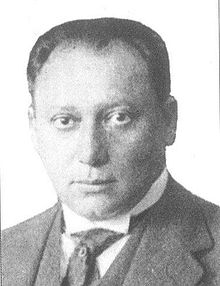- Olof Aschberg
-
Olof Aschberg (22 July 1877 – 21 April 1960) was a Swedish banker and businessman. Aschberg was a leftist sympathizer and helped finance the Bolsheviks in Russia. In gratitude, the Bolshevik government allowed Aschberg to do business with Soviet Union during the 1920s. Aschberg became head of Ruskombank, the first Soviet international bank.[1]
In 1912 he had founded in Stockholm the first Swedish bank for trade unions and cooperatives (Nya Banken) and became a friend of Hjalmar Branting. When financial operations in favour of the Germans in 1918 caused him trouble with the Allies of World War I, the bank was renamed Svensk Ekonomiebolaget.[2] He was already a successful banker and businessman when he met first Willi Münzenberg who visited the Stockholm Youth Socialist Congress of 1917.[3] Later, during the Bolsheviks aspirations to rebuild the Russian economy, it was Münzenberg's task to expand their modest pool of capital by floating a so called "workers' loan" using his "Workers International Relief" (WIR).[4] By means of this subterfuge the money used for buying machines and goods in the West looked like being the outcome of proletarian support, in reality it came directly from the Kremlin, confiscated from Russia's rich and the Church.[4] Established in Berlin in the 1920s, Aschberg's Guarantee and Credit Bank for the East was charged with repayment of the WIR workers' loan, although he had not been very fond of it from its very beginning on and had even contributed to deep six it soon after the launch. Aschberg had already gained the Soviet leaders' esteem by being one of the main connections in the early years after 1917 in evading the international boycott on gold robbed by the Bolsheviks, which he offered on the Stockholm market after having the bullions melted down and given new markings.[4]
He built up a collection of Russian icons with 245 pieces which he donated to the Swedish Nationalmuseum at Stockholm in 1933.[5] This largest and finest collection of icons outside Russia was supplemented in 1952 and put the Nationalmuseum among the leading museums in this field.
At the end of the 1920s Aschberg moved to France, where he bought Château du Bois du Rocher at Jouy-en-Josas, in 1950 offered to the Unesco and subsequently sold to the Yvelines department.[2] He helped finance the Popular Front during the Spanish Civil War. Again Münzenberg was often invited to Aschberg's Paris townhouse on the place Casimir-Périer and received the funds for launching Die Zukunft (The Future), a weekly political broadsheet.[4] The Left Bank townhouse was gradually transformed into a kind of all-purpose Münzenberg salon, which did attract the attention of the Gestapo, spying on the meetings taking place there.[4] With the outbreak of World War II Aschberg was interned in Camp Vernet by the French authorities.[6] Due to his Jewish background he was endangered when France was invaded by Nazi Germany in 1940 and could not sooner as January 1941 leave Europe via Lisbon when Vichy government gave order to set him free. Aschberg and his family fled to the USA where he immediately started to support the Free World Association. After the war, Aschberg moved back to Sweden. In 1946 he started publishing his memoirs in three volumes (En vandrande jude från Glasbruksgatan, Återkomsten, and Gästboken) and he invited Margarete Buber-Neumann to write there Under Two Dictators: Prisoner of Stalin and Hitler.[2]
Notes
- ^ Antony C. Sutton, Wall Street and the Bolshevik Revolution, chapter XI, 1974
- ^ a b c Alain Dugrand / Frédéric Laurent, Willi Münzenberg. Artiste en révolution (1889–1940), Paris, Librairie Arthème Fayard 2008, pp. 218–219, 585
- ^ Babette Gross, Willi Münzenberg: Eine politische Biographie, Stuttgart 1967, p. 142
- ^ a b c d e Sean McMeekin, The red millionaire: A political biography of Willi Münzenberg, Moscow’s secret propaganda tsar in the West, New Haven & London,Yale University Press 2003, pp. 135, 138, 296, 297, 301
- ^ Helge Kjellin, Icones Russes. Collection Olof Aschberg. Donation faite au Musée National, (Catalogues d'expositions du Musée National, № 45), Stockholm, Kungl. Boktryckeriet. P. A. Norstedt & Söner 1933, pp. 1–3
- ^ Thierry Wolton, Le grand recrutement, Paris, Bernard Grasset 1993, p. 183
Categories:- 1877 births
- 1960 deaths
- Swedish businesspeople
- Swedish communists
- Swedish people of the Spanish Civil War
- Swedish Jews
- Swedish memoirists
- Bolshevik finance
Wikimedia Foundation. 2010.

